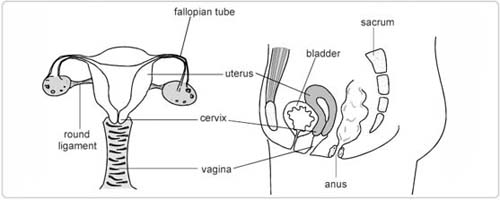What is it?
You are having trouble with your periods. They may be heavy, painful, or not regular, or all three. The doctor has not been able to find any serious cause. At the same time, he or she has not been able to find anything to help. If your womb is taken out - hysterectomy , the problem is solved. This is done through a cut in the tummy - an abdominal hysterectomy. At the same time, if the ovaries (the two small glands that produce the eggs) are diseased, they can be taken out as well, with the Fallopian tubes (which connect the ovaries with the womb). This is called a salpingo-oophorectomy.
|
The Operation
You will have a general anaesthetic and will be completely asleep. A cut is made in the lower part of the tummy. This will usually be a "bikini" incision across the tummy, just above the hair line. The uterus is taken out. If the ovaries are diseased, they are best removed as well. The space fills in naturally. The wound, and the skin, and the top of the vagina are closed up with stitches. There may be a fine plastic drainage tube running from the wound. All tissue will be sent to the laboratory to be examined under the microscope. You will be in hospital for about five days. If both ovaries are removed, you may have menopausal problems such as hot flushes and dizzy spells. You can stop them by taking hormone replacement therapy (HRT). This can be started with a small pellet of HRT implanted under the skin. It may even help you get over your operation quicker.
Any Alternatives
If you leave things as they are, the problems with your periods may go on for years. Hormone drugs have not helped. The loss of blood could make you quite ill with anaemia. The surgeon could just take out the lining of the womb - an endometrial resection. This may just lessen the bleeding without stopping it. There may in fact be a disease in your womb such as fibroids, making it safer if you have it all taken away. Sometimes the womb can be taken out through the vagina. This is not a good idea if the womb is very large, or is scarred by earlier operations on the tummy. A new way of hysterectomy is using keyhole surgery to free off the body of the womb. This is followed by bringing the womb out through the vagina. This can lead to a shorter hospital stay if it goes well. If not, the tummy has to be opened as for an abdominal hysterectomy.
Before the operation
Stop smoking and get your weight down if you are overweight. (See Healthy Living). If you know that you have problems with your blood pressure, your heart, or your lungs, ask your family doctor to check that these are under control. Check the hospital's advice about taking the Pill or hormone replacement therapy (HRT). Check you have a relative or friend who can come with you to the hospital, take you home, and look after you for the first week after the operation. Sort out any tablets, medicines, inhalers that you are using. Keep them in their original boxes and packets. Bring them to hospital with you.
On the ward, you may be checked for past illnesses and may have special tests, to make sure that you are well prepared and that you can have the operation as safely as possible. Please tell the doctors and nurses of any allergies to tablets, medicines or dressings. You will have the operation explained to you and will be asked to fill in an operation consent form. Many hospitals now run special preadmission clinics, where you visit for an hour or two, a few weeks or so before the operation for these checks.
After - In Hospital
The tummy wound may be painful. You may be given injections or tablets for the pain. A general anaesthetic will make you slow, clumsy and forgetful for about 24 hours. Do not make important decisions during that time. The nurses will help you with everything you need until your are able to do things for yourself. You will have a small, thin plastic tube (a drip) in an arm vein. This gives you salt and sugar and water, and sometimes blood, for a day or so from a plastic bag on a stand. You will have a sanitary pad in place. There will be slight bleeding like the end of a period. It should be almost nil by the time you leave hospital. You should wear pads. You will probably have a tube (a catheter) in the bladder for a few days. You will be able to take a bath or shower as often as you want but try to keep the wound area dry for a week. Any wound drain is usually removed the day after the operation.
You will have some blood and a urine tests a few days after your operation. These will check you are not anaemic and have no urine infection. r. If you have had the ovaries taken out, the HRT pellet will stop hot flushes for about six months. You can decide about more HRT then. The nurses will advise about sick notes, certificates etc.
After - At Home
You will feel tired and need frequent rests for a month or so. There may be some discharge from the vagina. There will be slight bleeding like the end of a period. It should be almost nil by the time you leave hospital. Use pads. Do not use tampons for six weeks. There are stitches in the top of the vagina. Sometimes the surface knots of the stitches will appear on the pads with some bleeding after about two weeks. This is quite normal. If the bleeding is heavy, contact the ward. You can drive as soon as you can make an emergency stop without discomfort, generally after four weeks or so. You will be able to start sexual relations before your six-week check if you are comfortable and have no bleeding or discharge. You may be able to return to a light job after about eight weeks, but you will not be able to cope with a busy job until at least 12 weeks.
Possible Complications
As with any operation under general anaesthetic there is a very small risk of complications related to your heart or you lungs. The tests that you will have before the operation will make sure that you can have the operation in the safest possible way and will bring the risk for such complications very close to zero.
Most hysterectomies are without complication. Minor complications occur in up to 2% of cases. Occasionally the bladder is slow to start working again. You may need the catheter back in the bladder for a few days. Wound infection is sometimes seen. This settles down with antibiotics in a week or two. Sometimes scarring in the vagina makes intercourse difficult or uncomfortable. This usually settles down with time.
More serious complications happen very rarely and can include severe bleeding or damage to your bladder, bowel and vessels and may require another operation to fix them.
Advanced Reproductive Technology
- In Vitro Fertilisation (IVF)
- Intracytoplasmic Sperm Injection (ICSI)
- Donor egg and embryo programs
- In Vitro Fertilisation (IVF)
- Pre-implantation genetic diagnosis (PGD)
- Surrogacy programs
Dental Videos






